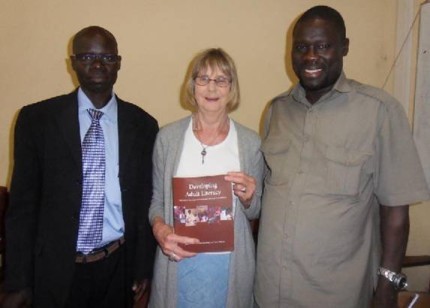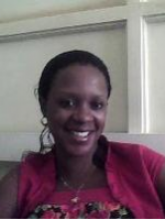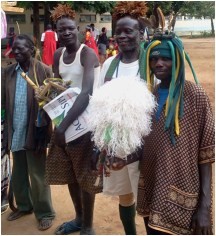On 13 April 2012, the School of Distance and Lifelong Learning (SODLL) and Centre for Lifelong Learning (CLL) were proud to host Dr Juliet McCaffrey, co author of “Developing adult literacy Approaches to Planning, Implementing and delivering literacy initiatives”. Dr McCaffrey shared her work experience and research in adult education including highlights from the book.
While sharing her work experience, Dr McCaffery said that her interest in adult literacy of marginalised communities started in the 1970s while she taught African American students in the USA. In the United Kingdom, Dr McCaffery worked on adult literacy programs in the voluntary sector in Brighton, in the statutory sector in the London Borough of Lambeth and as the first Gender and Development Officer for the British Council.
In Africa, she worked with the Nomadic tribes in Nigeria, ex-army officers in Egypt and also carried out trainings in South Sudan and Sierra Leone in the areas of Literacy, Conflict resolution and Peace building after war. Dr McCaffery also worked in Nepal, Pakistan and Yemen where she designed and evaluated literacy programs as well as training literacy educators.
Dr McCaffery noted that the book was written to explain the theoretical and conceptual framework of adult literacy approaches in a non academic manner to enable people working in the field to understand what they were doing. She pointed out the four key literacy concepts of the book; competency or skills based approach, functional or task based approach, social practice based approach and radical or critical based approach to literacy.
Regarding her research on Gypsies and Travellers, Dr McCaffery informed participants that gypsies had 20% lower literacy rates than any other minority group in the UK, had a history of not reading, felt that literacy did not give them status in the country and felt that they had other important things to do rather than read and write. However, the trend was starting to change with a number of them recognising the need to learn how to read and write mainly as a language discourse to negotiate with the police and politicians and registering with the doctor. Some had started taking their children to school and had taken on ordinary jobs
The talk was facilitated by Dr Willy Ngaka, Coordinator Centre for Lifelong Learning and attended by staff and students from SODLL and CLL.
By Sheila Mwebaze Tindi





